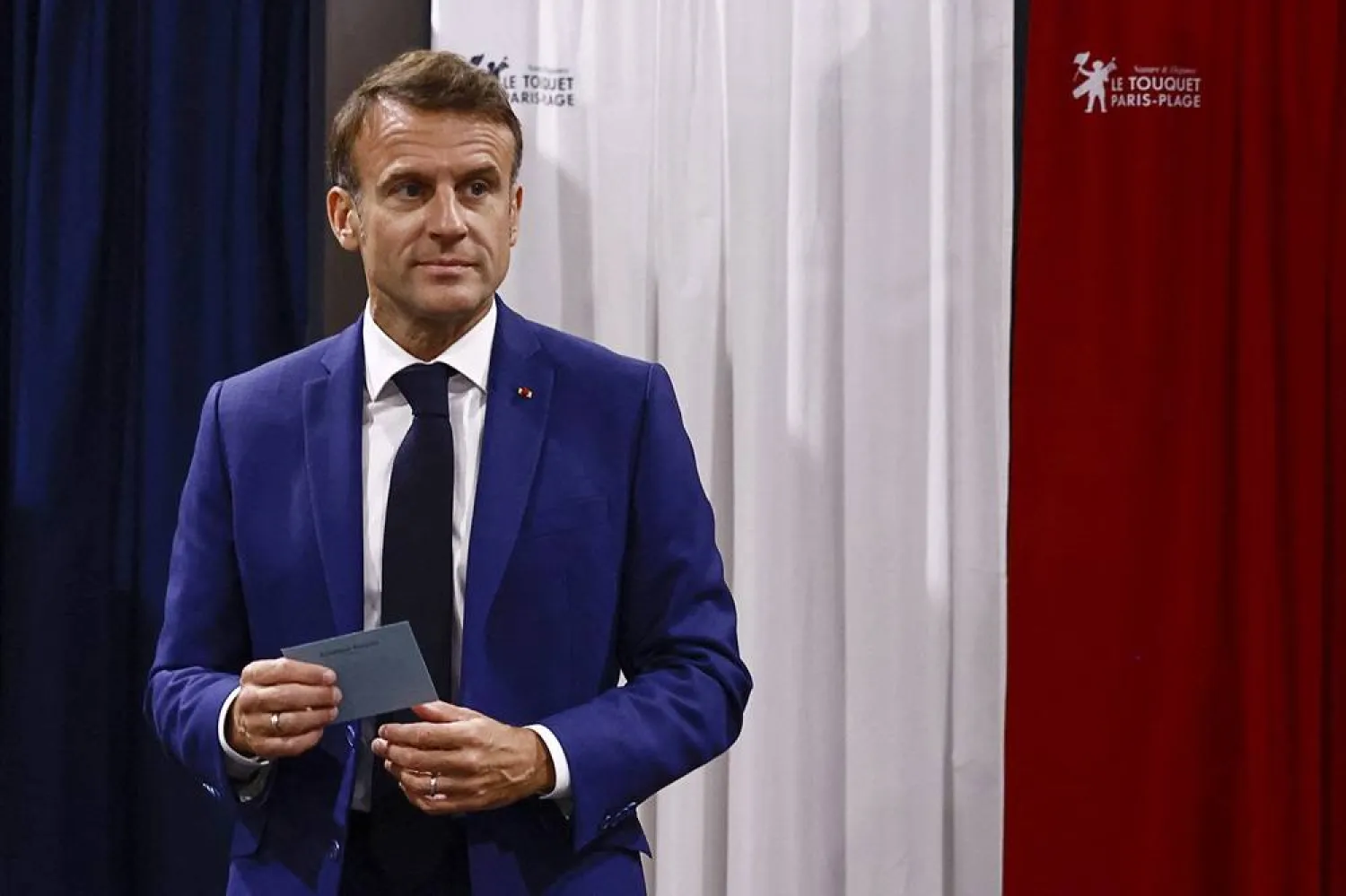French President Emmanuel Macron’s expected political failure in decisive parliamentary elections Sunday could paralyze the country, weaken him abroad and overshadow his legacy, just as France prepares to step into the global spotlight as host of the Paris Olympics.
France’s youngest-ever president is known on the international stage for his tireless diplomatic efforts and pro-European initiatives. Now, many wonder how he will manage to keep the reins of the country with likely no majority in parliament and a confrontational government. Constitutionally barred from running for a third consecutive term in 2027, Macron, 46, is facing a struggle not to become a lame duck.
Whatever the outcome of Sunday’s runoff, it’s not expected to be good news for Macron. French media have recently described an "end of reign" atmosphere at the Elysee presidential palace. Polls suggest Macron's centrist alliance is headed for defeat in Sunday’s runoff, after coming in third in the first round.
"It looks as if on the first ballot, the French wanted to punish their president," Paris-based political analyst Dominique Moïsi told the Associated Press.
Governing with a rival party will likely weaken Macron. If the far-right National Rally and its allies win a majority in parliament, it would place the centrist president in the awkward situation of having to work with an anti-immigration, nationalist prime minister. Otherwise, Macron may have to seek a way to form a functioning government, possibly by offering a deal to his left-wing rivals. In any case, he would no longer be able to implement his own plans, which have been based on pro-business policies meant to boost France’s economy.
"We are in the unknown. The unknown unknown," Moïsi said. "Because coalition governments are not a French tradition."
Abroad, Macron used to appear as a key world player known for his non-stop diplomatic activism. He has been deeply involved in Western steps taken to support Ukraine since Russia’s invasion in February 2022. In the Middle East, France has been pushing for diplomatic efforts with its Arab partners. Earlier this year, Macron also outlined his vision for the European Union, urging the bloc of 27 nations to build its own robust defense and undertake major trade and economic reforms in order to compete with China and the US.
The French Constitution gives the president some powers over foreign policy, European affairs and defense. But the division of power with a prime minister from a rival party remains unclear, and without the backing of a government, Macron’s role may end up being limited.
His pro-business policies lowered unemployment but were still controversial. The job of president is Macron’s first elected office. In his 30s, Macron quit his job as a banker at Rothschild to become Socialist President Francois Hollande’s economic adviser, working for two years by Hollande’s side at the presidential palace. Then, as economy minister in Hollande’s government from 2014 to 2016, he promoted a package of measures, notably allowing more stores to open on Sundays and evenings and opening up regulated sectors of the economy.
First elected president in 2017 after leaving the Socialists, Macron was then a successful 39-year-old political newbie. He sought to make the labor market more flexible and passed new rules to make it more difficult for the unemployed to claim benefits. His government also cut taxes for businesses to boost hiring.
The yellow vest anti-government protests soon erupted against perceived social injustice, leading to Macron being dubbed the "president of the rich." He is still perceived by many as arrogant and out of touch with ordinary people. Opponents on the left accused him of destroying workers’ protections. Macron argued that unemployment has fallen from over 10% to 7.5% now and France has been ranked the most attractive European country for foreign investment in recent years.
Macron was reelected in 2022, defeating for the second consecutive time his far-right rival Marine Le Pen in the runoff of the presidential election. But he lost his parliamentary majority, even though his centrist alliance took the largest share of seats in the National Assembly. He then struggled to pass an unpopular plan to raise the retirement age from 62 to 64, prompting months of mass protests that damaged his leadership. Last year, riots swept hundreds of cities, towns and villages after the fatal police shooting of a teenager.
Politically, the centrist leader launched his own party on a promise to do better than the mainstream right and left. But that, also, now appears as bound to fail. His call for snap elections actually pushed forward two major forces: the far-right National Rally and a broad leftist coalition including the Socialists, the greens and hard-left France Unbowed.
Macron's own camp questioned the president's political skills after he announced the surprise decision to dissolve the National Assembly last month. Bruno Le Maire, his finance minister for seven years, told France Inter radio that "this decision has created — in our country, in the French people, everywhere — concern, incomprehension, sometimes anger." Macron’s former prime minister, Edouard Philippe, accused him of having "killed" his centrist majority.
Macron's fate may become a topic for discussion next week at a NATO summit in Washington that will be the occasion for world leaders to meet with the new UK Prime Minister Keir Starmer.
"The paradox of the present situation is that as a result of the last two elections in Great Britain and in France, there will be more Great Britain and less France at the NATO summit," Moïsi said. "The strongest personality will be the new prime minister of Great Britain. And the weak personality will be the president of France."
















